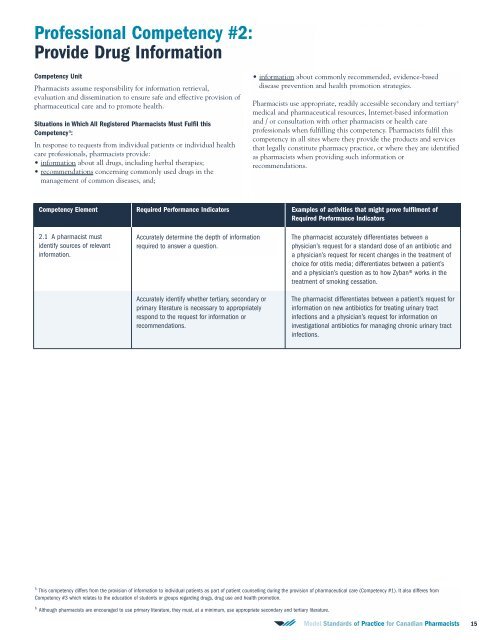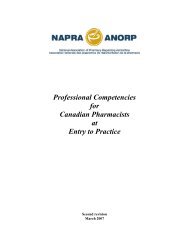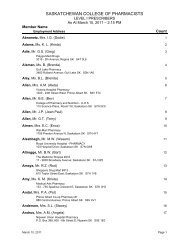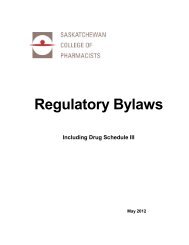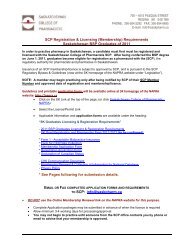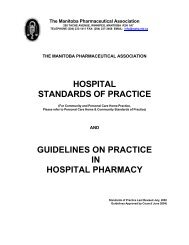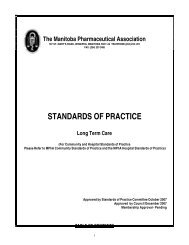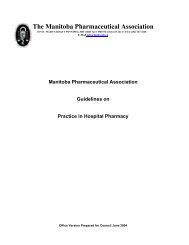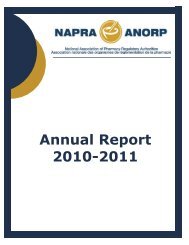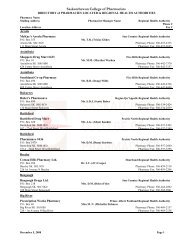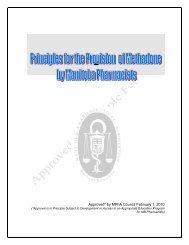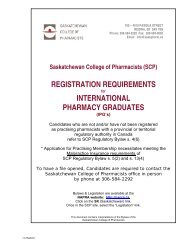Professional Competency #2: Provide Drug Information - NAPRA
Professional Competency #2: Provide Drug Information - NAPRA
Professional Competency #2: Provide Drug Information - NAPRA
You also want an ePaper? Increase the reach of your titles
YUMPU automatically turns print PDFs into web optimized ePapers that Google loves.
<strong>Professional</strong> <strong>Competency</strong> <strong>#2</strong>:<br />
<strong>Provide</strong> <strong>Drug</strong> <strong>Information</strong><br />
Optional Advanced Role: Possible Performance Indicators Examples of activities that might prove fulfilment of<br />
Possible Performance Indicators<br />
<strong>Competency</strong> Unit<br />
Pharmacists assume responsibility for information retrieval,<br />
evaluation and dissemination to ensure safe and effective provision of<br />
pharmaceutical care and to promote health.<br />
Situations in Which All Registered Pharmacists Must Fulfil this<br />
<strong>Competency</strong> 5 :<br />
In response to requests from individual patients or individual health<br />
care professionals, pharmacists provide:<br />
• information about all drugs, including herbal therapies;<br />
•recommendations concerning commonly used drugs in the<br />
management of common diseases, and;<br />
5. This competency differs from the provision of information to individual patients as part of patient counselling during the provision of pharmaceutical care (<strong>Competency</strong> #1). It also differes from<br />
<strong>Competency</strong> #3 which relates to the education of students or groups regarding drugs, drug use and health promotion.<br />
6. Although pharmacists are encouraged to use primary literature, they must, at a minimum, use appropriate secondary and tertiary literature.<br />
• information about commonly recommended, evidence-based<br />
disease prevention and health promotion strategies.<br />
Pharmacists use appropriate, readily accessible secondary and tertiary 6<br />
medical and pharmaceutical resources, Internet-based information<br />
and / or consultation with other pharmacists or health care<br />
professionals when fulfilling this competency. Pharmacists fulfil this<br />
competency in all sites where they provide the products and services<br />
that legally constitute pharmacy practice, or where they are identified<br />
as pharmacists when providing such information or<br />
recommendations.<br />
<strong>Competency</strong> Element Required Performance Indicators Examples of activities that might prove fulfilment of<br />
Required Performance Indicators<br />
2.1 A pharmacist must<br />
identify sources of relevant<br />
information.<br />
Accurately determine the depth of information<br />
required to answer a question.<br />
Accurately identify whether tertiary, secondary or<br />
primary literature is necessary to appropriately<br />
respond to the request for information or<br />
recommendations.<br />
The pharmacist accurately differentiates between a<br />
physician’s request for a standard dose of an antibiotic and<br />
a physician’s request for recent changes in the treatment of<br />
choice for otitis media; differentiates between a patient’s<br />
and a physician’s question as to how Zyban® works in the<br />
treatment of smoking cessation.<br />
The pharmacist differentiates between a patient’s request for<br />
information on new antibiotics for treating urinary tract<br />
infections and a physician’s request for information on<br />
investigational antibiotics for managing chronic urinary tract<br />
infections.<br />
Model Standards of Practice for Canadian Pharmacists 15
<strong>Competency</strong> Element Required Performance Indicators Examples of activities that might prove fulfilment of<br />
Required Performance Indicators<br />
2.1 (Continued) Accurately identify and name the tertiary and<br />
secondary resources available to appropriately<br />
respond to the request for information or<br />
recommendations.<br />
2.2 A pharmacist<br />
must retrieve<br />
information from<br />
relevant sources.<br />
Accurately manage requests for information or<br />
recommendations that are beyond their capabilities.<br />
Optional Performance Indicators reflecting<br />
advanced or exemplary practice:<br />
Accurately and efficiently locate relevant<br />
primary literature or resources based on<br />
extensive knowledge base and experience in a<br />
specialized field of pharmacy practice<br />
Consistently recognize and respond appropriately to<br />
the time frame requirements for a question or<br />
request for recommendation.<br />
Systematically access reliable information in a<br />
timely and accurate manner.<br />
Regularly use professional judgement to determine<br />
when sufficient, appropriate information has been<br />
obtained<br />
Optional Performance Indicators reflecting<br />
advanced or exemplary practice:<br />
Routinely and efficiently retrieve the information<br />
necessary to provide recommendations about<br />
all drugs, including herbal and complementary<br />
medicines.<br />
Obtain the required information in an efficient<br />
manner.<br />
Maintain an up-to-date and complete collection<br />
of primary literature relevant to his/her practice.<br />
16 Model Standards of Practice for Canadian Pharmacists<br />
The pharmacist assesses whether the Compendium of<br />
Pharmaceutical Specialties, American Hospital Formulary<br />
Service <strong>Drug</strong> <strong>Information</strong> or Therapeutic Choices provides<br />
appropriate information; determines if reference must be<br />
made to provincial antibiotic guidelines; identifies if<br />
information should be accessed from drug information or<br />
government web sites.<br />
The pharmacist identifies other pharmacists or health care<br />
professionals available to provide required information;<br />
consults with the appropriate experts or refers the requestor<br />
to the appropriate source of information.<br />
Examples of activities that might prove fulfilment of<br />
Optional Performance Indicator:<br />
The pharmacist refers to specific studies that address<br />
the request; maintains a network of contacts in<br />
specialized fields of practice<br />
The pharmacist responds rapidly to physician’s request for<br />
information required to prescribe for a patient in his/her<br />
office; considers workload and time available before<br />
promising a time frame for a response for more complicated<br />
information.<br />
The pharmacist obtains the appropriate information from<br />
tertiary resources, the Internet, pharmacists or other health<br />
care professionals.<br />
The pharmacist does not rely on a single, general text when<br />
newer references or DI bulletins are available; acknowledges<br />
when sufficient reliable information is not available to<br />
respond accurately to the request.<br />
Examples of activities that might prove fulfilment of<br />
Optional Performance Indicator:<br />
The pharmacist has an extensive knowledge of sources<br />
and types of drug information and selects the<br />
appropriate source; employs a structured systematic<br />
approach for responding to requests; utilizes a<br />
structured systematic approach for documenting<br />
questions and responses and makes use of such a<br />
system to facilitate responses to similar questions;<br />
completes primary literature searches appropriately and<br />
efficiently.<br />
— Continued
<strong>Competency</strong> Element Required Performance Indicators Examples of activities that might prove fulfilment of<br />
Required Performance Indicators<br />
2.3 A pharmacist must<br />
evaluate scientific<br />
information.<br />
2.4 A pharmacist must<br />
organize and disseminate<br />
information.<br />
2.5 A pharmacist must<br />
provide information on<br />
disease prevention and<br />
health promotion.<br />
Critically review information to ensure its<br />
appropriateness prior to responding to a request.<br />
Consistently present relevant, accurate information<br />
in a usable form and in a timely manner.<br />
The pharmacist provides an assessment of the relevance,<br />
applicability and accuracy of an article located by a patient;<br />
provides only relevant, accurate information to patients.<br />
Place information in perspective to current practice. The pharmacist explains why therapy cannot be based on<br />
suggestions made in popular magazines or un-referenced<br />
resources; explains why a single, well done study may not be<br />
applicable to a particular patient’s case.<br />
Optional Performance Indicators reflecting<br />
advanced or exemplary practice:<br />
Critically analyze primary or basic science<br />
literature as it applies to the provision of drug<br />
information and recommendations.<br />
Optional Performance Indicators reflecting<br />
advanced or exemplary practice:<br />
Proactively identify and fulfil drug information<br />
needs of individuals and groups.<br />
<strong>Provide</strong> recommendations about all legal drugs,<br />
including herbal and complementary medicines.<br />
Support health promotion campaigns related to<br />
recognition and management of common, critical<br />
diseases such as diabetes, cardiac disease, stroke,<br />
hypertension and breast cancer.<br />
<strong>Provide</strong> accurate information to patients inquiring<br />
about poison prevention.<br />
Optional Performance Indicators reflecting<br />
advanced or exemplary practice:<br />
<strong>Provide</strong> recommendations on disease<br />
prevention and health promotion<br />
Examples of activities that might prove fulfilment of<br />
Optional Performance Indicator:<br />
The pharmacist assesses the adequacy of research<br />
design, relevance, applicability, accuracy, reliability,<br />
validity and generalizability of primary literature.<br />
The pharmacist within several days provides a verbal<br />
summary and copies of information located to a physician<br />
asking for information about the use of a new antibiotic for<br />
community acquired pneumonia; provides an immediate<br />
verbal recommendation to a mother asking about the use of<br />
aspirin for fever in her infant.<br />
Examples of activities that might prove fulfilment of<br />
Optional Performance Indicator:<br />
The pharmacist prepares and distributes DI newsletters<br />
to patients or other health care providers.<br />
The pharmacist uses his/her drug information skills to<br />
participate in the development of formularies or drug use<br />
policies.<br />
The pharmacist makes available appropriate pamphlets or<br />
other prepared information regarding these conditions; when<br />
requested, provides verbal summaries of information<br />
contained in such pamphlets or other prepared information.<br />
The pharmacist explains appropriate safe storage of<br />
household products, medications, non-prescription drugs<br />
and vitamins around children.<br />
— Continued<br />
Model Standards of Practice for Canadian Pharmacists 17
Optional Advanced Roles: Possible Performance Indicators Examples of activities that might prove fulfilment of<br />
Possible Performance Indicators<br />
<strong>Drug</strong> Policy<br />
Actively seek or assume leadership roles in policy<br />
making regarding appropriate drug use.<br />
Routinely use evidence-based principles to make<br />
recommendations for drug policy.<br />
<strong>Drug</strong> <strong>Information</strong> Use complex forms of analysis to discover issues<br />
requiring the provision of drug information or drug<br />
use recommendations.<br />
Actively promote their role in the provision of drug<br />
information and recommendations by identifying<br />
needs in populations (communities) beyond their<br />
individual practice site.<br />
Prepare and present routine sources of drug<br />
information.<br />
Undertake specialty employment in a drug<br />
information or related centre.<br />
Routinely assess the outcomes of drug information<br />
provided to individual clients.<br />
Health Promotion Routinely work with patients to plan and attain<br />
health goals related to health promotion.<br />
Regularly offer educational events that focus on<br />
disease prevention and general health promotion.<br />
18 Model Standards of Practice for Canadian Pharmacists<br />
The pharmacist volunteers for membership in policy-making<br />
committees; accepts responsibility for developing key<br />
recommendations regarding reimbursement.<br />
The pharmacist uses primary literature to assess the<br />
therapeutic and pharmacoeconomic benefits of one drug<br />
relative to another for inclusion in a formulary or coverage in<br />
a drug program.<br />
The pharmacist analyses drug use patterns within the<br />
practice setting (from various data sources including<br />
surveys, data bases); analyses documentation completed<br />
for management of individual patient’s drug related<br />
problems; completes surveys of clients to identify need for<br />
information or recommendations.<br />
The pharmacist creates linkages with other pharmacies to<br />
identify issues in drug use; completes surveys of clients to<br />
identify needs for information or recommendations.<br />
The pharmacist writes review articles, education articles or<br />
continuing education articles; prepares and distributes new<br />
drugs bulletins or newsletters; offers drug information<br />
columns in newspaper or advice shows on TV, radio, or<br />
Internet.<br />
The pharmacist discusses the value of good nutrition and<br />
exercise for an overweight patient and refers him/her to a<br />
dietician if appropriate; addresses the requirement for<br />
bicycle helmets for children.


